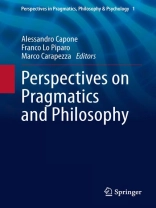This book is about the pragmatics of language and it illustrates how pragmatics transcends the boundaries of linguistics. This volume covers Gricean pragmatics as well as topics including: conversation and collective belief, the norm of assertion, speech acts, what a context is, the distinction between semantics and pragmatics and implicature and explicature, pragmatics and epistemology, the pragmatics of belief, quotation, negation, implicature and argumentation theory, Habermas’ Universal Pragmatics, Dascal’s theory of the dialectical self, theories and theoretical discussions on the nature of pragmatics from a philosophical point of view.
Conversational implicatures are generally meaning augmentations on top of explicatures, whilst explicatures figure prominently in what is said. Discussions in this work reveal their characteristics and tensions within current theories relating to explicatures and implicatures. Authors show that explicatures and implicatures are calculable and not (directly) tied to conventional meaning.
Pragmatics has a role to play in dealing with philosophical problems and this volume presents research that defines boundaries and gives a stable picture of pragmatics and philosophy. World renowned academic experts in philosophy and pragmalinguistics ask important theoretical questions and interact in a way that can be easily grasped by those from disciplines other than philosophy, such as anthropology, literary theory and law.
A second volume in this series is also available, which covers the perspective of linguists who have been influenced by philosophy.
Tabella dei contenuti
Chapter 1. Margaret Gilbert and Maura Priest, Conversation and collective belief.- Chapter 2. Martin Montminy, The single norm of assertion.- Chapter 3. András Kertesz and Ferenc Kiefer, From thought experiments to real experiments in pragmatics.- Chapter 4. Michael Devitt, What makes a property “semantic”?.- Chapter 5. Steven Gross, What is a context?.- Chapter 6. Michael Haugh, Implicature, inference and cancellability.- Chapter 7. Siobhan Chapman, Grice, conversational implicature and philosophy.- Chapter 8. Claudia Bianchi, Writing letters in the age of Grice.- Chapter 9. Douglas Walton and Fabrizio Macagno, Implicatures as forms of argument.- Chapter 10. Marina Sbisà, Some remarks about speech act pluralism.- Chapter 11. Michel Seymour, Speech act pluralism, minimal content and pragmemes.- Chapter 12. Paolo Leonardi, Language adds to context.- Chapter 13. Kepa Korta, John Perry, Squaring the circle.- Chapter 14. Wayne Davis, Irregular negations: Pragmatic explicature theories.- Chapter 15. Anne Bezuidenhout, The (in)significance of the referential/attributive distinction.- Chapter 16. Paul Saka, Quotation and the use-mention distinction.- Chapter 17. Nellie Wieland, Indirect reports and pragmatics.- Chapter 18. Alessandro Capone, Immunity to error through misidentification (IEM), ‘de se’ and pragmatic intrusion): a linguistic treatment.- Chapter 19. Alessandro, Capone, Further reflections on Semantic Minimalism: Reply to Wedgwood.- Chapter 20. Igor Douven, Putting the pragmatics of beliefs to work.- Chapter 21. Alberto Voltolini, Contexts, fiction and truth.- Chapter 22. Alec Mc Houl, Pragmatics and philosophy: three notes in search of a footing.- Chapter 23. Luvell Anderson and Ernie Lepore, A brief essay on Slurs.- Chapter 24. Frans van Eemeren and Bart Garssen, Viewing the study of argumentation as normative pragmatics.- Chapter 25. Francesca Piazza, Rhetoric and pragmatics: suggestions for a fruitful dialogue.- Chapter 26.Marcelo Dascal, Debating with myself: Towards the psycho-pragmatics and onto-pragmatics of the dialectical self.- Chapter 27. Lo Piparo, Franco. Truth, negation and meaning.












